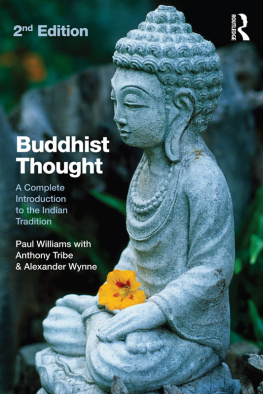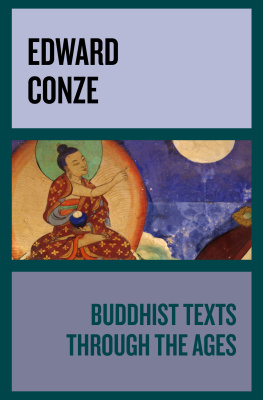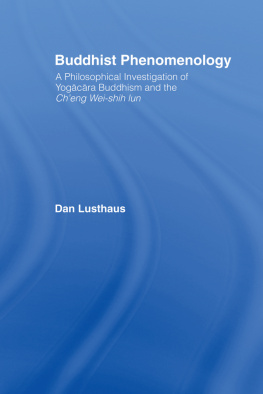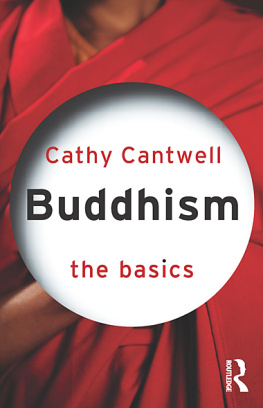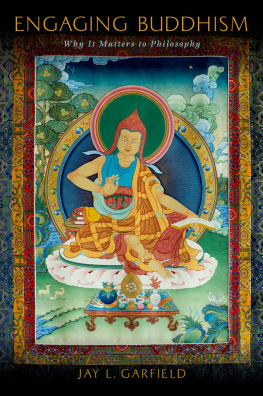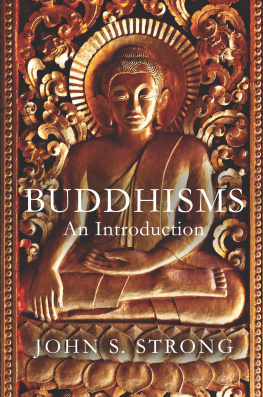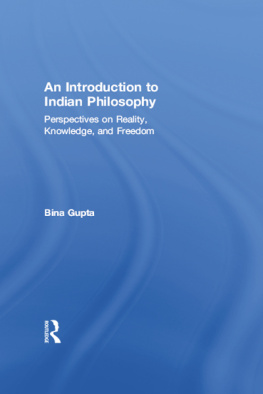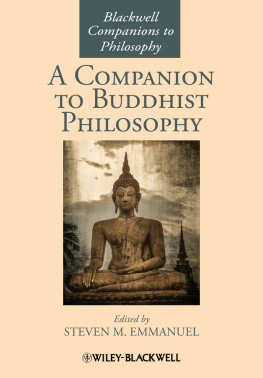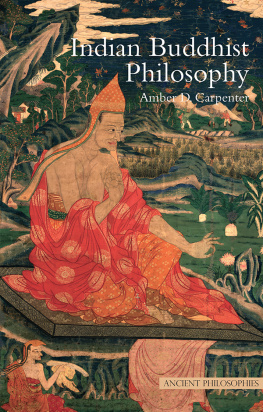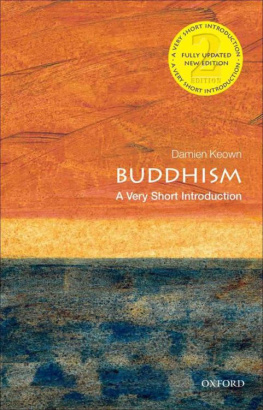Buddhist Thought
I know of no more lucid expositor of Indian or Buddhist philosophy... Though there is no shortage of introductions to Buddhism on the market, I found this one compelling reading... I shall recommend this lively and authoritative volume to all my students.
Richard Gombrich, University of Oxford, UK
This book serves as an accessible and reliable survey for students wishing to gain familiarity with the basic ideas of Buddhist philosophical and religious thought, and with some of the recent research in the field. It guides readers towards a richer understanding of the central concepts of classical Indian Buddhist thought, from the time of Buddha to the latest scholarly perspectives and controversies. Abstract and complex ideas are made understandable by the authors clear and engaging style. The second edition has been fully revised in light of new scholarship, in particular on Mahyna Buddhism and Tantric Buddhism, an often neglected and inadequately understood topic. As well as a detailed bibliography this authoritative resource now includes recommended further reading, study questions, a pronunciation guide and extensive glossary of terms, all aimed at helping students to develop their knowledge and appreciation of Buddhist thought.
Paul Williams is Emeritus Professor of Indian and Tibetan Philosophy at the University of Bristol, UK. His books include Mahyna Buddhism: The Doctrinal Foundations (second edition, Routledge).
Anthony Tribe is a specialist in Indian Tantric Buddhism and formerly taught in the Asian Studies Program at the University of Montana, USA.
Alexander Wynne is Assistant to the Co-Director of the Dhammachai Tipiaka Project at Wat Phra Dhammakya, Thailand.
Buddhist Thought
A complete introduction to the Indian tradition
Second Edition
Paul Williams
with Anthony Tribe and
Alexander Wynne

First published in 2000
This second edition published 2012
by Routledge
2 Park Square, Milton Park, Abingdon, Oxon OX14 4RN
Simultaneously published in the USA and Canada
by Routledge
711 Third Avenue, New York, NY 10017
Routledge is an imprint of the Taylor & Francis Group, an informa business
2000, 2012 Paul Williams, Anthony Tribe and Alexander Wynne
The right of Paul Williams, Anthony Tribe and Alexander Wynne to be identified as the authors of this work, has been asserted by them in accordance with sections 77 and 78 of the Copyright, Designs and Patents Act 1988.
All rights reserved. No part of this book may be reprinted or reproduced or utilised in any form or by any electronic, mechanical, or other means, now known or hereafter invented, including photocopying and recording, or in any information storage or retrieval system, without permission in writing from the publishers.
Trademark notice: Product or corporate names may be trademarks or registered trademarks, and are used only for identification and explanation without intent to infringe.
British Library Cataloguing in Publication Data
A catalogue record for this book is available from the British Library
Library of Congress Cataloging-in-Publication Data
Williams, Paul, 1950
Buddhist thought : a complete introduction to the Indian tradition / Paul Williams with
Anthony Tribe and Alexander Wynne. 2nd ed.
p. cm.
Includes bibliographical references and index.
1. BuddhismIndiaDoctrinesTextbooks. I. Tribe, Anthony. II. Wynne, Alexander, 1974III. Title.
BQ339.W55 2011
294.342dc23
2011023457
ISBN: 978-0-415-57178-4 (hbk)
ISBN: 978-0-415-57179-1 (pbk)
ISBN: 978-0-203-15317-8 (ebk)
For Shad once more, and for Rhea
Preface
This book is a complete revision of the first edition, published originally in 2000. It has been revised in the light of the wealth of new scholarship that continues to appear on all areas of Buddhism, but in particular on Mahyna and tantric Buddhism. We have also added several appendices lacking in the first edition, aimed at helping students to develop more deeply their study and appreciation of Buddhist thought.
The purpose of the book remains a straightforward one. It is to serve as an accessible and reliable guide for students wishing to reach, as quickly as possible, a familiarity with the basic ideas of Buddhist philosophical and religious thought, and the results of some of the latest research in the field. A good understanding of the way Buddhism developed in India is an essential prerequisite for any appreciation of Buddhist ideas elsewhere, in Tibet, China, or Japan and the other countries of East Asia.
The book aims to give a comprehensive first survey of Buddhist thought, devoting adequate balanced space to basic, early and mainstream Indian Buddhism, the views of some of the philosophical developments, and the often neglected and inadequately understood topic of tantric Buddhism. It will also serve as an introduction to Buddhism as such, providing the reader remembers that the interests of the authors are mainly in religious and philosophical thought, that is, essentially, in doctrines. There is of course much more to a religion as something lived by all its members at all levels in history and society than its ideas on these topics no matter how central they might be. But it is arguable that without a good grounding in Buddhist doctrine it is very difficult for the student to gain a proper appreciation of what is going on in Buddhism as it occurs in the day to day lives of Buddhists themselves.
The authors of this book have between them many years of experience in teaching Buddhism at school and university level, in the United Kingdom, the United States and in Asia. They have also taught Buddhist thought in the context of centres for Westerners who are interested in practising Buddhism but who want a proper academically respectable grounding in Buddhist doctrine. In writing this book they have borne in mind the interests and difficulties of such students, particularly students coming from a background in theology, religious studies, and philosophy rather than, say, Asian languages. The authors have tried very hard to make ideas accessible that can sometimes seem abstract and complex. The use of technical terms in Asian languages has been kept to a minimum. Where necessary, both the Sanskrit and the Pli versions of terms have been carefully indicated. Unless the contrary is stated, however, a technical term is in Sanskrit. Where both terms are given, the Sanskrit is usually given first. The exception is where the context is a discussion of a source in Pli. In that case the term is in Pli, or the Pli version is given first. The reader should have no problem in knowing which language a term is in.
Because this book is intended as a guide for students a central feature is the full Bibliography. This is in order to enable students to know where to find material that might interest them for further study. We have done our best to list all the works referred to in the text. In particular the primary sources the Indian writings themselves have been included with reference to reasonably reliable translations where available, and also where to find the Sanskrit, Pli, Tibetan and Chinese texts. Thus it is hoped that the book will be of value as well to those who are familiar with these languages, as a study resource.
If there is a common thread running through much of this work it is that of the central distinction for Buddhists between the way things appear to be when seen by ordinary unenlightened people, and the way they actually are. Things are seen the way they actually are by those like Buddhas who are enlightened, that is, awakened to the truth. This distinction has given Buddhism an acute interest in issues of ontology, i.e. what can be said really to exist. Such matters are essentially philosophical. In Buddhism philosophical insight coming to understand things the way they really are has transformative moral and spiritual implications. On the other hand there are areas of Buddhist thought that are treated in this book only cursorily or not at all. For example, there is not a great deal of direct discussion here of Buddhist ethics. Buddhist thinking on the role and potential of women, or ecology, or politics, for example, is scarcely treated at all. For this we offer no apology. Some selection was inevitable. This is an
Next page
